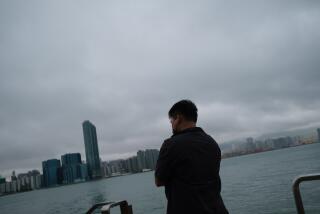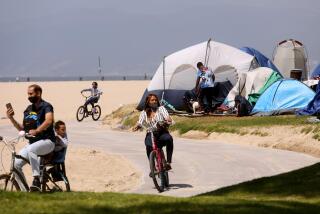40 Hurt in Clash of Hong Kong Police, Vietnam ‘Boat People’ : Refugees: Stone-throwing camp residents feared they would be forced to return home. Another group of 111 leaves voluntarily for Hanoi.
- Share via
HONG KONG — Police raided a Vietnamese refugee camp Friday and clashed with stone-throwing “boat people” who reportedly feared they would be forced to return to their Communist homeland. Hong Kong officials said 40 people were injured.
Police fired tear gas after the Vietnamese set fire to blankets and threw rocks to prevent a search for homemade weapons, said government spokesman Timothy Li. Twenty-seven Vietnamese were arrested and more than 700 weapons seized, police said.
Earlier Friday, a group of 111 “boat people” voluntarily left Hong Kong on a chartered airliner for Hanoi rather than face months or years in the crowded camps without hope of resettlement abroad.
The 111 people made up the eighth group to return to Hanoi under a U.N.-sponsored voluntary repatriation program, bringing to more than 865 the number of Vietnamese who have willingly gone home.
Their calm departure was in sharp contrast to the scene two weeks ago when Hong Kong police put 51 weeping “boat people” aboard a plane and sent them to Hanoi against their will.
Hong Kong is now seeing a steady trickle of voluntary departures from its camps, but government officials say this is not enough and forced repatriation will resume next month.
The U.N. High Commissioner for Refugees is urging the British colony to put off plans to send more people back against their will and give the voluntary program a chance.
Television footage of Friday’s camp raid showed police equipped with helmets and shields firing tear gas. Smoke from the fires could be seen rising above the center on outlying Lantau Island, which houses more than 3,000 Vietnamese.
“The ‘boat people,’ in order to make the operation more difficult, pushed their women and children to the front,” said Security Secretary M. Geoffrey Barnes.
The government-funded radio reported that the resistance may have been prompted by reports that some of those in the center may be in the next group of “boat people” forced to return to their impoverished homeland.
Officials refused to say how many police joined in the operation, but the radio put the number at about 300. Police said Friday night that said 14 Vietnamese and 26 guards and policemen were injured in the camp.
The officials said five hours of counseling by the staff of the U.N. High Commissioner for Refugees and voluntary agencies failed to persuade the Vietnamese to cooperate.
Police reported two clashes Thursday night between Vietnamese armed with homemade weapons at the Shek Kong Detention Center in which one person died and 10 others were injured.
Police said they were investigating the cause of the brawls between two rival groups from Quang Ning. About 100 people were involved in the fighting.
According to police, five people have died this year in factional fighting that erupts frequently in the crowded and squalid Vietnamese camps.
“This latest violence is a further manifestation of the unrest in the camps caused by the threat of forced deportation,” said George Foulkes, of Britain’s opposition Labor Party. “I fear that it is a foretaste of worse to come unless the government abandons its policy.”
Foulkes also accused Britain of delaying deportations at the request of the U.S. government.
“While they are dithering and delaying, the situation in the camps is reaching boiling point,” he said.
A Foreign Office spokesman, who requested anonymity, said in response: “The facts are that considerable assistance is being given through our reintegration package to the ‘boat people.’ . . . We are not waiting for Washington.”
About 44,000 “boat people” who have sailed into Hong Kong since mid-June, 1988, are considered illegal immigrants unless they can prove they fled persecution.
Those who are denied refugee status and have their appeals rejected can volunteer to go home or face forced repatriation.
The 12,000 “boat people” in Hong Kong who arrived before the screening program were automatically granted refugee status and are awaiting resettlement overseas. About 4,500 have been resettled in third countries, mainly the United States and Canada.
More to Read
Sign up for Essential California
The most important California stories and recommendations in your inbox every morning.
You may occasionally receive promotional content from the Los Angeles Times.













